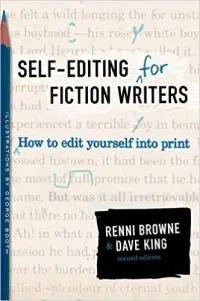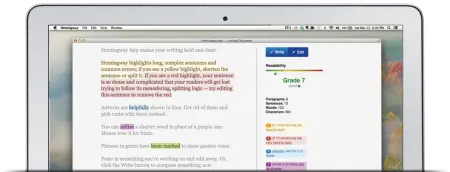Should you hire an editor for your novel?
Yes, you should. But if you write short fiction and are looking to submit your writing for publication, you probably need to self-edit your stories. Having an editor on call isn't feasible and it can get real expensive, real fast. At the same time, you want your writing to be the best it can be, even when you know your manuscript is going to be edited by a professional before publication. Novels or shorter work, you're here because you want to know how to do the grunt work yourself.
Here are the basics of self-editing.
1. Let it lie.
You wrote the thing, now’s the time to let it rest for a bit. For short stories, a few days might be enough, maybe a week. For longer works, a week to a month would be better. You need to be able to come back to it with fresh eyes. The more it reads like a stranger wrote it, the better your eventual edits will be. Don’t roll your eyes at me. You know it’s true.
2. Format Your Manuscript.
Make this easy on yourself and your eventual editor down the line: Format your manuscript for ease of reading. It'll also come in handy for when you want to submit your stories. Most markets link to Shunn's Manuscript Format as their preference, and for the rest of them, well, no editor is going to yell at you for using it. Learn it, love it.
Here are some more tips:
- Save your manuscript as a Word document (.doc). The .docx format doesn’t always play nice with everyone's edition of Word. If you use Open Office, that’s fine too, just make sure the file can be opened and edited in Word.
- Double space (your lines). Makes it easier to read and spot errors.
- Single space after periods. It's the only way.
- Times New Roman is your friend. 12pt is a good font size.
- Make sure you’ve marked all your scene breaks and chapter breaks, either with asterisks (scenes) or page breaks (chapters.)
3. Learn About Self-Editing
Remember, this is a crash course. If you want to delve deeper into this, you can (and should) pick up a couple of books that will help you along your way. I feel no shame in suggesting the same book everyone else does: Strunk's Elements of Style is a good primer. I like Self-Editing for Fiction Writers. The Blue Book of Grammar and Punctuation is a good layman's grammar book, if you're feeling completely lost or English is your second language. From there, pick whatever appeals to you, as there's a ton of them out there.
4. Pick Your Approach.
Decide how you want to do this: Edit directly in your word processor or print a copy out.
I know a lot of writers who swear by editing only in hardcopy (and I have no reason to doubt them), but I’m lazy that way; I do everything in my word processor. Transferring edits from the print out back to Word sounds painful, but you might be braver than I am.
Reading your manuscript out loud (or having it read to you by another person or software) can also be helpful with the flow and dialogue especially. There's a variety of free programs that can do it for you and the Kindle has that option as well.
5. Trim the Fat.
There’s always something to cut, even in the shortest story or the most tightly written novel. Stephen King says he always cuts around 20% of his word count, but there are no hard and fast rules; do what's right for you.
Look for lines, paragraphs or pages where not a lot happens, where the plot isn’t advanced and no characterization takes place. You most likely don’t need any of it. You'll find most of it will correspond to days when you weren't quite in the zone and you were writing down stuff and trying to get the ball rolling. Nothing wrong with that, but cut with abandon.
6. Search for Common Errors.
Probably the easiest problem to fix, but you might as well do the dirty work yourself. Look for words you know you often misspell, both by reading the text and using Word's Search function. You can do the same thing for your punctuation. Look for double spaces, check your em dashes, quotation marks and parenthesis-related punctuation mishaps.
There are always some perennial classics everyone seems to get wrong now and then, like the following:
- a lot/alot
- it’s/its
- that/who
- that/which
- their/they’re/there
- wether/whether/weather
Well, a ''wether'' is a male sheep, but mistakes happen.
7. Look for Crutch Words.
Every author has his favorite words; some they just like, some they use when they're feeling unsure about their writing. They can be easy to spot by readers and while it's not a huge problem, it can be irritating.
There’s specialized software you can use to check out your word usage. It can be hard to judge how often is too often, but you’ll be surprised at how much you use certain words in your writing.
Scrivener has a Word Frequency option that will point them out to you and there's a Word plugin you can download that's essentially the same thing. You might as well check your adverb usage while you're at it.
8. Use a Machine.
There’s a variety of software that claims it can help you edit. Some of them cost a pretty penny, some of them are free. I've only found them useful for some very basic editing, but your mileage may vary.
I like the Hemingway Editor, which has both a downloadable app and an online version (the online one is free, though it might be limited in some way). It checks for complicated wording and phrases that are hard to parse, as well as adverbs and passive voice. Available for Mac and PC.
There's also Autocrit, ProWritingAid and a slew of others you can check out.
9. Kill your dialogue tags.
Just do it. No ''he sighed,'' ''he moaned,'' ''he barfed.'' Just he said and maybe a he screamed here and there if the occasion calls for it.
10. Hire an Editor?
Well, you're not gonna like this, but it's never a bad idea to get professional help. Either you're self-publishing (in which case, definitely hire an editor) or you want to put your best foot forward when it's time to submit your book to agents and publishers. While I can't point you to anyone in particular, your favorite social network or writer community will probably have some tips. Google is always your friend as well.
Got a good editing tip? Caught a mistake in this article? Let us know in the comments.

About the author
George Cotronis lives in the wilderness of Northern Sweden. He designs book covers and sometimes writes. His stories have appeared in XIII, Big Pulp and Vignettes from the End of the World. He is also the editor in chief at Kraken Press and Aghast: A Journal of the Darkly Fantastic. You can see his work at www.ravenkult.com or read his rants over at his blog.










